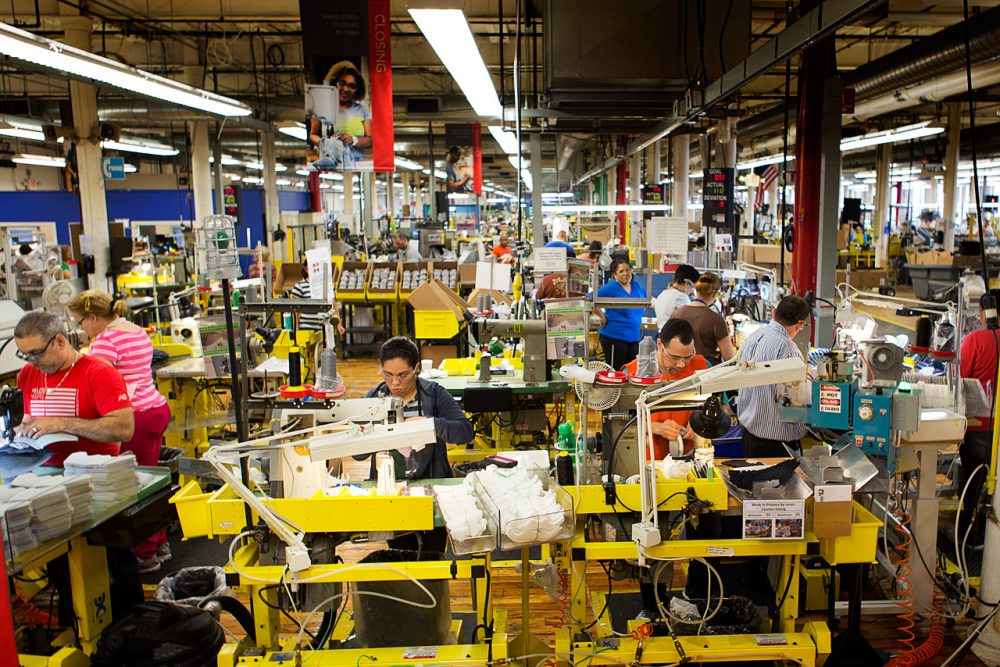Advertisement
Lawrence Sees Job Growth, But Unemployment Remains Elevated
Resume
Third in an occasional series called “Project Lawrence”
LAWRENCE, Mass. — As of April, the seasonally unadjusted unemployment rate in Lawrence was 11.9 percent, more than double the state's jobless rate of 5.6 percent.
But, at the same time, this old industrial city has been adding jobs at a faster rate than the state. So, if the city is growing jobs, why is unemployment so stubbornly high?
Upstairs, Downstairs
Dozens of sewing machines buzz on the New Balance factory floor. The factory alone produces 2,820 pairs of shoes a day.

The vast majority of the workers on the floor — stitching the leather or packaging the shoeboxes — are Latino, according to Marcela Armijo, an HR manager.
"The entry-level jobs that we have in the factory, they all come, the majority come from Lawrence," Armijo says. "I would say about 95 percent of the manufacturing associates live in the city, live in Lawrence."
But upstairs, where the designers and engineers sit, you won't find many folks from Lawrence. Armijo says her company has trouble filling the professional office positions with people from the city.
"Like, right now, we have a chemical engineer, that's probably not going to come from the city of Lawrence," she says. "We have a director of domestic development, so things like that, very few Lawrence residents."
Her colleague Rosa Lopez interrupts and adds, "the challenge in Lawrence is finding folks that have the education background to fill those roles."
The Language Barrier
In Lawrence, we're not just talking about higher education. A major setback is basic English education. At New Balance, even the breaks on the factory floor are counted in Spanish.
The language barrier is a career obstacle around the city. More than a third of the population is foreign-born. And all the ESL classes are at capacity.
The city estimates there are about 1,200 ESL spots, most either free or with a nominal fee. The mayor is trying to add more seats.
At the Lawrence CommunityWorks center, ESL classes are offered most evenings, and Mailyn Lara religiously attends.
Before immigrating to the United States, Lara was studying engineering in the Dominican Republic. These days, she's planning on getting her nursing assistant certification, but she worries that she's going to end up becoming a health care aide for life, stuck in a blue collar job. Ideally, she wants to go back to school and finish her engineering degree.
The current hiccup is English.
Complicated Numbers
[sidebar title="Some Key Lawrence Data:" width="375" align="right"]
April Unadjusted Unemployment Rate:
- Massachusetts: 5.6%
- Lawrence: 11.9%
Foreign-Born Population, 2008-2012:
- Massachusetts: 14.8%
- Lawrence: 36.6%
Hispanic or Latino Population, 2010:
- Massachusetts: 9.6%
- Lawrence: 73.8%
Language Other Than English Spoken At Home, 2008-2012:
- Massachusetts: 21.7%
- Lawrence: 74.7%
Bachelor's Degree Or Higher, 2008-2012:
- Massachusetts: 39%
- Lawrence: 10.8%
- Sources: Mass. Office of Labor and Workforce Development, U.S. Census Bureau.
[/sidebar]
Lawrence has a reputation for poverty and high unemployment, but the truth is more complicated — at least according to research by Barry Bluestone, an economist at Northeastern University who's examined the city for the Dukakis Center for Urban and Regional Policy.
"Lawrence has actually been fairly successful relative to other working cities — or Gateway Cities, these older industrial cities — in creating jobs," Bluestone says.
Between 2001 and 2013 — the latest data Bluestone offers — the number of jobs in Lawrence increased by 8 percent.
Jobs increased by less than 1 percent statewide, over the same 2001-2013 period, according to Bluestone.
"So, Lawrence, in a sense, was doing eight times better than the state," Bluestone explains. "The problem is that as it was creating many of these jobs, many of them did not go to Lawrence residents."
The other unique statistic Bluestone notes is the high number of new establishments created in Lawrence over the last decade. But, he has a word of caution.
"We had about the same number of establishments created as we had jobs — about 700," he says. "So, these are lots of new establishments, but they're not creating a lot of jobs."
Bluestone says in immigrant-heavy communities he tends to see lots of tiny businesses.
"In Lawrence, a large number of them are just private households," he says. "This is where somebody is working for one other person — either working in daycare or working to clean their homes or is a gardener."

The Sandbox
But that unique labor force is also the city's strength, some say.
A couple of years ago, local businessman Desh Deshpande started the Merrimack Valley Sandbox to capitalize on the immigrant entrepreneur potential in the region.
David Parker, the organization's executive director, acknowledges that many of the startups in Lawrence might not employ a lot of people, but "you gotta do a million things at once to affect something as big as the unemployment rate."
The Sandbox has already assisted nearly 200 entrepreneurs in Lawrence.
"It's a numbers game," Parker says. "If we could get hundreds of startups happening in these communities, some of them are gonna be extraordinarily successful, you know, just like 99Degrees Custom."
99Degrees Custom, housed in the historic Everett cotton mills, makes built-to-order apparel, such as aprons, sports bras and rock climbing jackets.
Community leaders love to talk about 99Degrees Custom as the prototypical Lawrence startup because Brenna Schneider created the company last year, and now she employs 10 people.
"The model here is to employ workers in Lawrence and Lowell and train them in relevant skills and help them work up and out into higher-paying, advanced manufacturing careers," Schneider explains.
At 99Degrees Custom, no worker is paid less than $10 an hour, but still, Schneider says, apparel is not an end job. It's not a field that offers livable wages to support a family, so she wants to partner with the local community college to help her staff learn more high-tech manufacturing skills.
Schneider is a graduate of the Sandbox accelerator program.
The Sandbox essentially transplants the high-tech incubator model from Cambridge into Lawrence. The key difference between the two communities: the types of businesses pitched.
"So, here in Lawrence, we see, in particular from the Latino community, many, many ideas for businesses that are using your hands or are meant to sell to other folks from Latino backgrounds," Parker says.
The group holds pitch contests in English and Spanish.
On a recent spring evening, dozens of people crowded around the basement of the Christ United Methodist Church in Lawrence to hear business plans from entrepreneurs. The ideas ranged from an innovative yoga mat to an early childhood education program. One of the judges was Danaris Mazara, who won $3,000 from the Sandbox herself earlier this year.
Entrepreneurial Ideas
A couple years ago, Mazara's husband was laid off. She was working at Walmart in neighboring Methuen.

"But my paycheck wasn't enough to pay all my bills, all the needs of my family," Mazara says. "And, one day, my mother came home, and she told me, 'I have $35 in a food stamp card. You want to use some, buy some food?' And, I was like, 'Mama, this is not enough.' "
So she went to the store, and instead of buying food, she bought ingredients to make cakes and flan and started selling the desserts.
At the end of the next week, she had made more than $500.
These days, she bakes cakes for any occasion — birthdays, baby showers and weddings. She describes her desserts as "Dominican-style cakes," sort of like pound cake, but more moist and filled with pineapple, strawberry or dulce de leche.
Mazara eventually quit her job at Walmart. She's now started her own company called Sweet Grace Heavenly Cakes. She employs one other woman and dreams of opening up a storefront bakery in Lawrence.
And it's not far-fetched fantasy. Many people in Lawrence open up small, interdependent shops. Broadway street in Lawrence is a small business paradise, peppered with nail salons and barbershops.
But Bluestone says these entrepreneurial ideas are just one piece of the economic puzzle. He says in order to really bring that stubbornly high unemployment number down, the city needs to invest heavily in education and job training for new expanding fields, like health care.
About a third of the degrees and certificates the local community college gave out last year were in the health profession.
Education might not add up to a lower unemployment rate immediately, but at least it'll help Lawrence residents compete for jobs that currently go to folks from out of town.
This segment aired on June 5, 2014.
